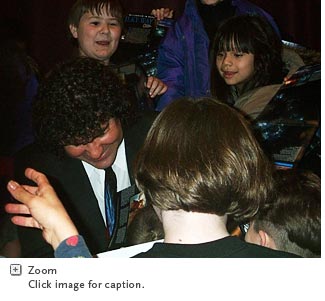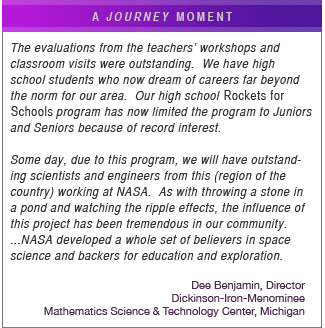| |
 |
 |
 As
part of normal program operations, the National Center for
Earth and Space Science Education is committed to providing
baseline assessment of the Journey through the Universe
program in four key areas: As
part of normal program operations, the National Center for
Earth and Space Science Education is committed to providing
baseline assessment of the Journey through the Universe
program in four key areas:
- Whether Journey through the Universe met the
strategic education goals that were set forth by the community.
- The effectiveness of the programming components delivered
by the Visiting Researchers and Visiting Educators—the Educator
Workshops, Classroom Visits, and Family and Public Programs.
- The effectiveness of the educational materials employed
as the core program curriculum—the Education Modules or
a Customized Curriculum—to meet curricular need, and be
implemented in the classroom.
- The effectiveness of the program coordination efforts
of both the program staff at the Center and the community’s
Local Team.
Assessment is conducted with the community’s
Local Team members, the attendees of the programming in the
community, the presenters, and program staff at the Center.
Assessment reports are provided to the Journey
through the Universe community, the presenters, and,
as appropriate, other stakeholders. Assessment provides
the community critical feedback, and serves to inform the
Center as to new programmatic directions and areas for needed
improvement. |
| |
 |
You can explore program objectives, assessment
protocols, and assessment results, as well as download the
baseline assessment tools and community reports, for each
of the following Journey through the Universe program
components:
|

|
The baseline assessment provided
as part of normal program operations can be augmented with
additional studies to assess the program’s strategic impact
both in the short term and longitudinally. For
example, given the systemic nature of the Journey through
the Universe program—it’s ability to be implemented across
an entire grade level, and with lessons that can be integrated
into the Earth and space science curriculum—protocols can
be developed to assess impact on standardized test scores,
and at a time when No Child Left Behind mandates testing in
science.
 As
a working example of what is possible, the National Center
for Earth and Space Science Education recently worked with
Baltimore City Public Schools (BCPS) to define and integrate
a robust assessment analysis into their proposed Journey
through the Universe program—which targets all 7,000
5th graders, their teachers, and their families. BCPS
would implement a Customized Compendium of Lessons as the
5th grade Earth and space science curriculum, which has been
tailored to the Maryland Voluntary State Curriculum (VSC).
The assessment would be conducted by BCPS’s Division of Research,
Evaluation, Assessment, and Accountability to assess: 1) the
level of implementation by teachers in the classroom across
the 5th grade teaching staff, and 2) program impact on students
as gauged by benchmark testing (grade-level wide) and from
scores in science on the standardized state test (MSA). As
a working example of what is possible, the National Center
for Earth and Space Science Education recently worked with
Baltimore City Public Schools (BCPS) to define and integrate
a robust assessment analysis into their proposed Journey
through the Universe program—which targets all 7,000
5th graders, their teachers, and their families. BCPS
would implement a Customized Compendium of Lessons as the
5th grade Earth and space science curriculum, which has been
tailored to the Maryland Voluntary State Curriculum (VSC).
The assessment would be conducted by BCPS’s Division of Research,
Evaluation, Assessment, and Accountability to assess: 1) the
level of implementation by teachers in the classroom across
the 5th grade teaching staff, and 2) program impact on students
as gauged by benchmark testing (grade-level wide) and from
scores in science on the standardized state test (MSA).
An Executive
Summary of the proposed BCPS program provides an overview
of the objectives, the programming components customized to
the school district’s needs, and elements of the assessment
plan. A more comprehensive overview of assessment
metrics for the program can also be explored.
The National Center for Earth and Space Science
Education will work with your community to develop an assessment
plan appropriate to your needs. |
|
|
